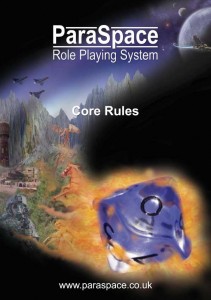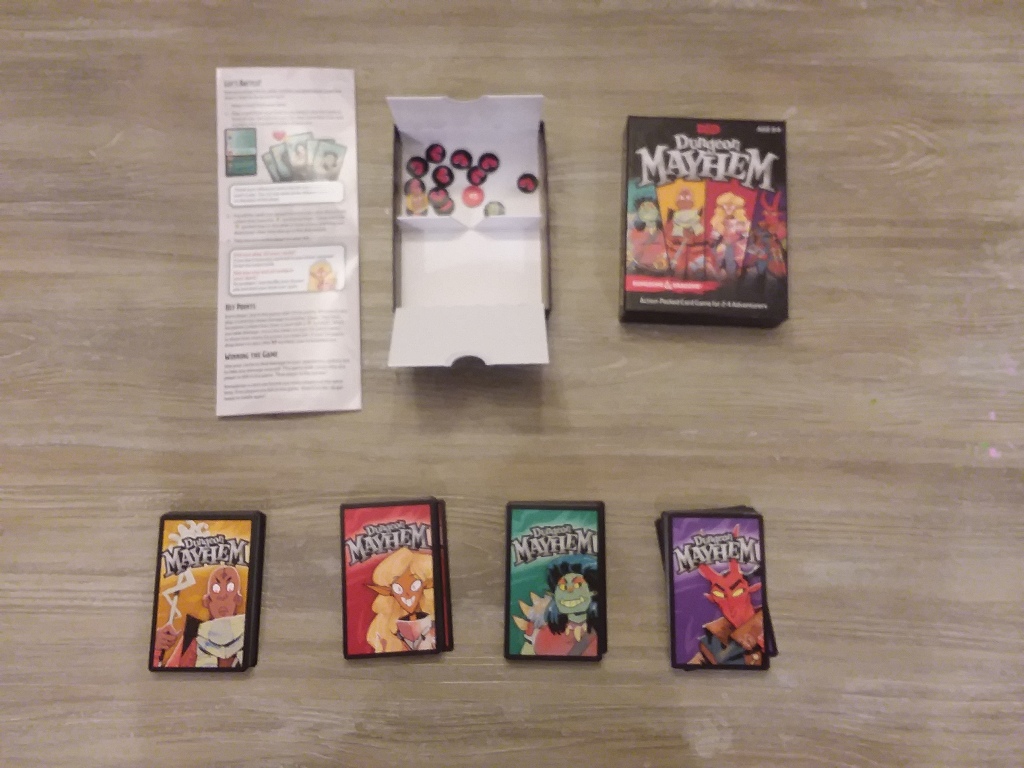ParaSpace
ParaSpace is a complete generic universal role-playing system written by Daran Plows and published by ParaSpace.
By Aaron T. Huss

ParaSpace is a generic universal system that provides the core mechanics to play within any setting and any genre. It utilizes a standard roll-over the target number using 2d10 plus any number of applicable modifiers calculated on your character sheet. It avoids the use of character classes, allowing you to create any type of character desired for whatever setting and genre you choose to play. Players choose from a list of skills, spells, and abilities to shape and mold their character in the fashion they imagine them to be. There are no predetermined lines of advancement outside of what spells need to be learned as prerequisites for others, furthering this idea that your character’s design is completely in the hands of the player.
ParaSpace makes an overzealous attempt to be the system with mechanics that encompass every genre possible. While expert RPG players may enjoy the excessively high amount of granularity, beginner and casual gamers could easily be overwhelmed by the number of options. With that in mind, this game is highly detailed with an excruciatingly high quantity of options to choose from.
THE PLAYER’S GUIDE
The Player’s Guide is a collection of all the core rules required to create and advance characters outside of magic and special abilities. It contains an overview of all the steps required including chapters on skills, equipment, combat mechanics, transports, movement, situational rules, and experience.
Character creation is extremely detailed and each step involved includes an extensive number of options along with d10 or d100 charts to roll against to randomly create your character. This includes all the details to flesh out your character including relationships, social standing, and many other items that other systems use as game fodder while ParaSpace sometimes uses them to create modifiers and additional changes to the character. There are a number of mechanics that affect a number of other mechanics in a variable way such as age and education affecting your starting skill points. It’s a lot of detail and a lot of steps involved to create a character.
Character creation has a lot of base ranks, modifiers, and calculations that need to be paid attention to closely to prevent confusion and ultimately creating your character incorrectly.
MAGIC
Magic contains all the mechanics and spells surrounding the different types of magic: arcane, transcendental, inherent, and special abilities (magic-like abilities). The list of spells is quite large covering the four magic types (covers almost 100 pages) and provides possibly every spell you could ever need. As with character creation, it contains an extensive number of options and is extremely detailed. Each spell is fully described including all prerequisites, associated stats, and description. Another note is that spells are purchased using variable experience points essentially weighting each spell against every other spell.
THE GM’S SECTION
The GM’s Section contains a lot of the typically found GM information covering the different aspects of running a role-playing game including the GM’s role, using the rules, designing a setting, adversaries, and magic items. Most of this is standard except the adversaries. Instead of providing an actual bestiary that specifically defines the characteristics of a certain adversary, the NPC Templates includes generic templates to apply to specific groups of adversaries such as “Small Creature” and “Huge Creature.” Additionally, around five examples are given for each one as a quick reference. This method helps to keep the system universal and gives GMs a good starting point for creating their own bestiary. Simply take the template, flavor it a bit, make a couple minor tweaks, and you have yourself a ready-to-use creature.
Following the NPC Templates are actual natural animals and a few warriors. Nothing out of the ordinary and simply staples found in almost every bestiary.
OVERALL
ParaSpace is not the game you pick-up when you want to teach someone what role-playing games are all about. It is not the game you use to convince your players to leave the system they love so much to try another. It is not the game you use to run short one-shots or random scenarios. ParaSpace is a highly detailed, highly optioned, generic universal role-playing system that can be used for any setting and any genre. It has an immense amount of character granularity during creation and advancement allowing players who want a lot more from their role-playing games the freedom they desire. It is a game that you play when the typical RPG design just doesn’t allow you to play the character you really want to play in the style you really want to play them. If you can overcome the excessively high number of mechanics, modifiers, and calculations, then this game just might be for you.
RATINGS
Publication Quality: 9 out of 10
The ParaSpace book is a beautiful publication. The format and layout look excellent with easy to read text and headers that really make the different sections stand out. The PDF is fully bookmarked and easy to navigate. Overall, it’s a very good looking publication and that exhibits a very professional quality. I’m not overly impressed with the illustrations and their location, but they add a bit of visual appeal to the publication. The biggest factor affecting the quality of this book is how well every mechanic is defined, described, and detailed; sometimes to a point of excess.
Mechanics: 5 out of 10
ParaSpace suffers from what I call mechanics bloating. There are too many options and too many mechanics trying to do too many things. A good example is that there is a list of skills that covers 4 1/2 pages, and this is just the list, not the descriptions. While trying to be completely generic and universal, ParaSpace goes too far in creating too many options instead of presenting vague options that can be used universally across multiple genres and settings. To make matters worse, it uses a variable XP system where skills, abilities, and spells have varying XP costs. This type of system reminds me of GURPS, except the XP variations swing quite significantly from the low to the high end.
Another example of mechanics bloating is the excessive use of modifiers and calculations throughout. Just looking at the convoluted character sheet is enough to scare the casual gamer away at how many boxes need to be filled in and calculated out. Another example of this is the weapons list. Every melee weapon carries 19 stats that either stand-alone or modify the character sheet.
This helps to confirm my statement that ParaSpace is for the advanced role-player and not the beginner or casual player. Advanced players who are looking for more granularity in creating and advancing their characters along with creating a more realistic look and feel to their game settings will find this style of mechanics expansive than a less-complicated system.
Desire to Play: 6 out of 10
As already stated, I think beginner and casual role-players will be quickly scared off by the sheer weight of the mechanics within ParaSpace. After spending so much time just creating a character is bound to turn many players away. However, expert players or those bored with simplistic systems may find it quite exciting and enjoy the fact that they can create fine details that flesh out the character they truly want to play. ParaSpace is very generic and its mechanics are primarily universal (genres will not find use with all the skills, but all genres are represented), meaning you probably won’t ever need another core supplement providing additional mechanics. All you need is to create the setting flavor and the mechanics are there to support it. A lot of mechanics.
Overall: 7 out of 10
In an age where role-playing games cover the gambit of overly-simple to overly-complicated, there seems to be a fan-base for every level of game play. Outside of GURPS, is there really another role-playing system that gives you as much freedom for creativity as ParaSpace? Probably not, or at least none that I’ve seen. ParaSpace is a game of options and modifiers, and there is no lack of either one. If you can grind through character creation or just grab one of the pre-generated characters inside the book, there’s a good chance that you can create very exciting adventures and campaigns through any genre and setting imaginable.




Hi,
Thanks to the reviewer for taking the time to look at ParaSpace.
For those that may be interested, at our web site, <a href=http://www.paraspace.co.uk, we do offer a free of charge 80page Basic Rule pdf that introduces the fundamental mechanics without so many of the options and variables. We are also working on a couple of supplements and welcome any feedback to the material that is currently available at our Wiki.
Thanks again
Daran